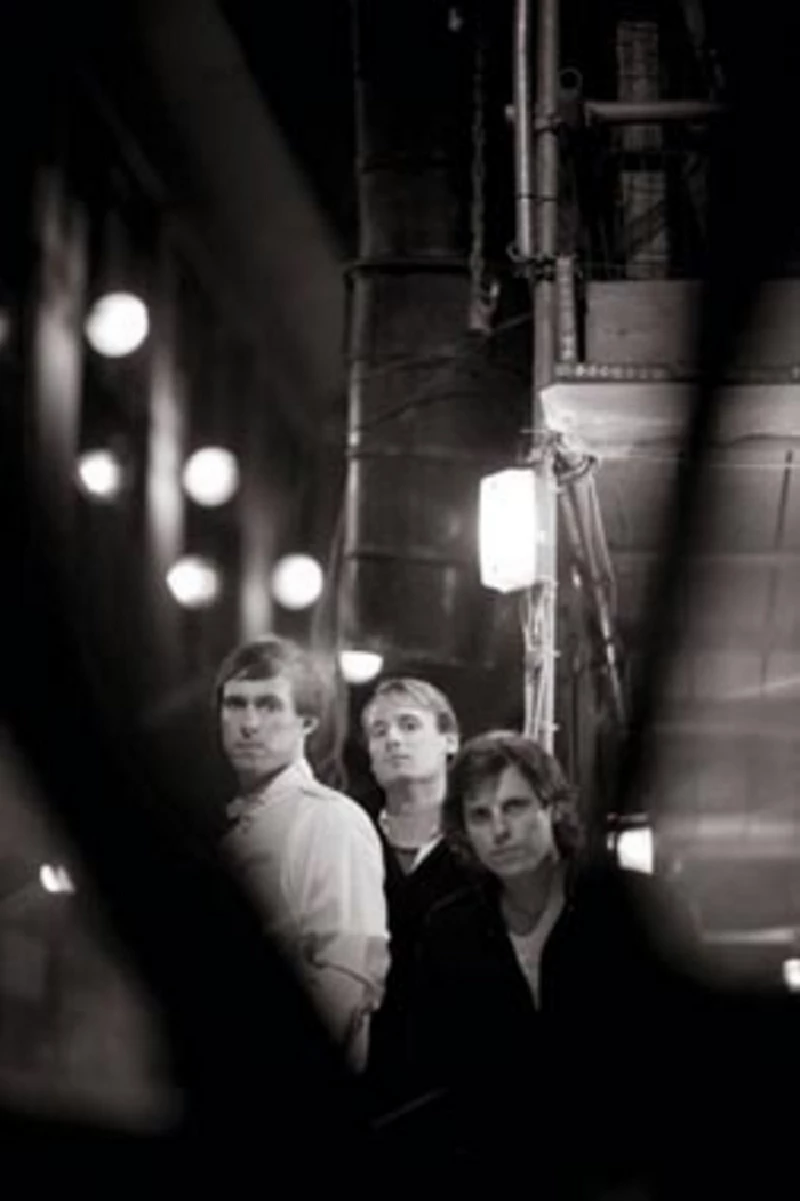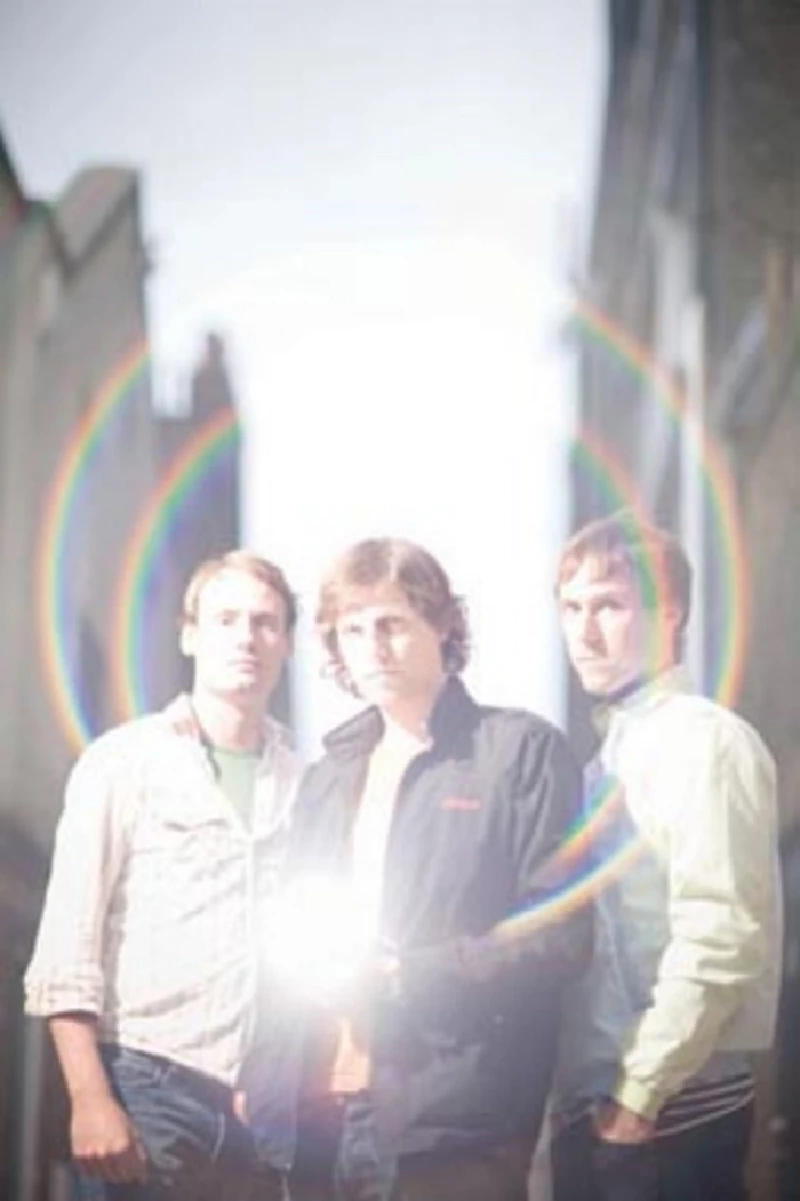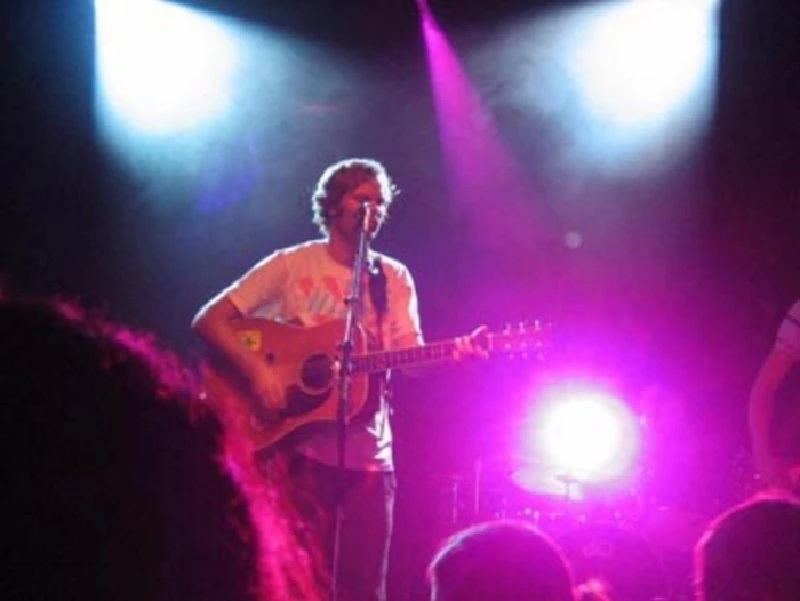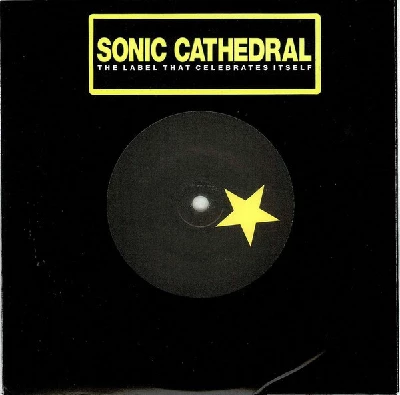Early Years - Interview
by Dominic B. Simpson
published: 22 / 11 / 2006

intro
The Early Years' orgasmic effects and reverb-driven drone noise workouts have cemented their position as one of the most exciting live acts from London around. Dominic Simpson speaks to them about their self-titled, debut album
Soaked in orgasmic effects and reverb-driven drone noise workouts, the Early Years have cemented their position as one of the most exciting live acts from London around. The previous times I saw them were ecstatic affairs, the driving drums pummelling a focused trance rhythm into the back of my head as their music stormed ahead with it’s oscillating, hypnotic drive. It’s a synapse-bending heady mix of freeform experimentation and pop tunes that are most incendiary live, peaking in magnificent, euphoric explosions of sound. There are antecedents in their sound, for sure – Neu!, Can, and Faust; the drone-rock that appears on labels like Kranky, Cherry Red and Constellation; the Secret Machines; Spacemen 3, Spiritualized, and the Jesus and Mary Chain; the Velvets and the Stooges; the ‘shoegazing’ scene of the early 90’s; even Echo and The Bunnymen and the Stone Roses’ first album in the band’s more accessible moments – but really these are more fuel to the fire of an awesomely gifted young outfit, rather than cumbersome influences that cast a long shadow. This is one great band, an act that deserves to go big without being miscast by any labels or fashion magazines. And their album’s pretty good too. But more of that later. I’m sitting in a pub-cum-restaurant near Cargo, a fashionable East London venue. Later on, the band will take the stage to a rapturous set, performing against a backdrop of some stunning revolving kaleidoscopic fractal images, the visuals complimenting perfectly their white-hot wall of drones and thundering motorik rhythms. The band is on the road, touring in support of iLIKETRAINS, to promote their new single and debut, self-titled album. From ‘All Ones and Zero’s’ opening hypnotic riff that owes equal debt to the Gods of Neu! and Spiritualized, to the tender closing piano-embellished ballad ‘This Ain’t Happiness’, the album’s a classic that’ll take some beating. There’s ‘Things’, which starts off as a lonely ballad and then explodes into a fireworks of chorus pedal guitar work and handclaps. ‘The Simple Solution’ and ‘So Far Gone’ are upbeat metronomic classics, driven along by killer riffs and hazy, winding e-bowed guitars, reminiscent of the second half of Sonic Youth’s spiralling track ‘Washing Machine’, speeding ahead on the motorway to who knows where, just as with the motorcycled nihilistic protagonist in Neu!’s ‘Hero’. ‘Musik Der Frühen Jahre’ is the most obvious tribute to the afore-mentioned 70’s German progressive rock influences, an instrumental employing backwards guitar and a processed drum beats. Elsewhere, ‘Brown Hearts’ and ‘High Times And Low Times’ display a more subdued, calm side to the band, with their ripples of guitar and reflective vocals. Relaxing after their soundcheck, we adjourn at a nearby bar in the centre of Shoreditch. Over Thai food, the band – Roger Mackin on guitar, Dave Malkinson on guitar and vocals, and Phil Raines on drums, together with new member Steve (I never capture his surname) on bass – reminisce on the early days. “It was in Bethnal Green at the Pleasure Unit”, Dave remembers. “Roger booked a gig with another band playing called the Sirens…he wanted me to do some psychedelic support. So I prepared a setlist – just me and a sampler.” “Chris did an acoustic set, then Dave did his Early Years set, then I did my garage punk set”, Roger recalls. Malkinson and Raines had relocated from Blackpool, while Mackin had jammed with Raines. Thus, “we got Phil to jam on drums”, Dave remembers. As the waiter comes over to take the orders, Phil recalls, “Our first rehearsal was in March 2004. The first gigs came after that.” A string of triumphant effects-laden shows followed, including sets supporting the likes of Electrelane and the Double, both of whom are on the Beggars Banquet family of labels that includes Too Pure, Matador, and XL. The connection being that the Early Years themselves had signed to Beggars, a dream come true for the band: “Before I was on Beggars it was my life ambition to make an album, and now I’ve made one. I’m very happy”, Phil puts it simply. “One of our best ever gigs was playing with Electrelane at the ULU. It was a really good night – the sound was wicked”, Dave recalls eagerly. As their sound developed and became a more sophisticated hydra-head of cosmic twists and turns, the band felt the need to incorporate some low end into their sound. “Steve’s playing with us at the moment on bass”, Dave considers. “Basically what’s happened is that it’s always been us three, and then when we were recording our album, any one of us would just hop on bass and put down a bassline on t ape. And then we realised that once we finished the record the bottom end of the actual music was missing when we played live, so we needed to get someone in to play bass and fill that bottom end area. So on tour Steve’s playing with us on bass, which he’s done really well. I’d actually miss the bass now if he wasn’t playing with us live.” Although the sound didn’t suffer from lack of bass when this writer captured their gigs as a threesome, the band feel that a lack of some thick strings needed rectifying. Did you use alternative tunings to compensate? DM: “Yeah. You have to compensate it so you have to write the songs around the musicians you’ve got with you, and that’s what we basically did – jamming with just two drums and guitars. Loads of people are saying to us now – ‘You know, no disrespect to Steve, but it actually sounds better without the bass’. The only reason why we didn’t have one is because we didn’t know one…we put adverts in Loot and NME and got no response.” Indeed, it’s difficult to find much class in the endless adverts put forward by 45-year olds from Essex wanting to do Joe Cocker covers – “what’s wrong with that!?” laughs Roger, somewhat sarcastically. Occasionally, though, a great act can arise from the moribund sea of mediocrity. The album is brimming with memorable hooks and real songs, but like Bikini Atoll – another Pennyblackmusic favourite – the sound employs an even mix of drone textures and left-field experimentation alongside more recognizable song structures. An example is 'Song for Elizabeth', an album highlight that begins as a fantastic warm singalong with trebly vocals (possibly sung through an amp) and bluesy guitar, replete with Mo Tucker-style drums (think later Jesus and Mary Chain and Velvet Underground), before the song morphs into an amorphous flow of ambient drone, occasionally punctuated by a whisper of vocals and reverbed free-flowing guitars. It’s a beautiful bliss-out track perfect for a summer day in the park. It wouldn’t be out of place on a record by Chicago act Growing or one of the other acts that feature on the Kranky labels. Likewise the slow, woozy instrumental ‘Harmonic Interlude’, which hints at darker, autumnal hues. Meanwhile, the call-and-response chiming guitar notes that conclude ‘High Times and Low Lives’ remind me of the instrumental dynamics replete in Explosions In The Sky’s workouts. So how do your songs evolve? Is it just through repeated jamming? RM : “It can be quite often through repeated jamming, it can be someone coming in with a germ of an idea. And then it could be one of us will coming in with a complete song – there’s a few tracks on the album that are like that - and then we’ll work out how to arrange it. So the meat is always put on the bones through extended jamming. It’s never someone coming in with a seamless guitar part – ‘you play this and I’ll play that; you haven’t played the perfect right note there’. It’s all quite organic.” DM : “Half of it…there’s a song called ‘The Simple Solution’ on the album, and I had that riff for years, and we started jamming; it didn’t really do anything for us, but I knew it was a good riff so we put it to one side, and kept coming back to it and eventually it turned out well. That’s how a lot of our stuff works – we’ve all got these ideas and we see how it goes.” RM : “It was that drum beat that did it.” As this writer will tell you, while practices can be exciting germinations of new ideas, they can sometimes also be a frustrating long slog after working all day in an office. The band immediately agrees that playing regularly and holding down day jobs is, in their own words, “really hard. Try doing that and practising twice a week with a gig on top.” But gigging regularly can be frustrating for another reason, in that while it tightens your sound, it can prevent new, innovative material from emerging in practice. Dave agrees: “The annoying thing we have to do is rehearse for gigs. We’d rather come up with new material and jam, but we have to rehearse for gigs, which is quite annoying.” Roger agrees. “I just want to play what ever comes in my head. But these gigs have to be rehearsed.” It’s a relief for the band, then, that in a few weeks they will take the stage with former Can member Damo Suzuki at the cheekily named Sonic Cathedral night - “a 100% improvised set,” they boast. Not only is the significance of playing with a former Krautrock legend – albeit via Japan – obvious, but the gig allows the band to expand the experimental palette that’s dotted on their album, held loosely together in a patchwork by the song structures. Suzuki, of course, has played with all kinds of musicians in the last few years, including jamming with atmospheric Boston post-rock outfit Cul de Sac. “It’s quite liberating to be able to go on stage and not actually conform to the tracks that you have to play”, Phil enthuses. “Apparently he [Suzuki] goes [indicates] ‘You start’; ‘you next’”, Roger laughs. The experience of playing the same songs nearly every night on tour logically leads to a desire to experiment with a free-flowing improvised jam – think of the MC5 (or rather, the remaining members) jamming with the Sun Ra Orkestra a while ago at the Barbican, or Spiritualized’s Jason Pierce performing with Spring Heel Jack. A mention of Sun Ra and the MC5 provokes interest from the band, which makes me ask: is there any other acts that you like at the moment? Phil takes the cue from my mention of 'Song for Elizabeth’s free-form wash by claiming to like a lot of the acts on the afore-mentioned Kranky label, but then adds, “I mean, to be honest, a lot of the new bands nowadays today leave me cold.” Do you mean the NME bands? DM : “There seems to be a rather large juxtaposition at the moment, doesn’t there?” The melancholy electronic outfit Pulseprogramming, on the Asthetics label, is mentioned as one favourite. Richard then adds, “My favourite album this year was Richard Hawley – 'Coles Corner'. That’s been our record on the tour bus really. [Sings] ‘Leave me down by the ocean…’” The band are insistent, however, that while their unique music is more than the sum of their influences and undoubtedly their own, it’s also partially a result of the different strands that the band members take in. Phil professes a love for the close-knit Chicago post-rock scene that has birthed the likes of Tortoise, The For Carnation and David Pajo’s various pseudonyms (though he now lives in NYC, apparently): “We were listening to Jeff Parker [Tortoise guitarist] the other day…that sort of jazz-influenced stuff….I’m really into the whole Chicago post-rock scene… This guitarist out of Tortoise”, he enthuses, referring to Parker, “is a classical jazz-musician. He’s a lecturer at this Jazz Institute – he’s just released his second solo album.” Do you like Krautrock-influenced bands such as Stereolab and Yo La Tengo? Do you see yourself in the vein of those bands? “Stereolab’s really good but the vocals ruin it…”, Dave considers, before Roger interjects, “I mean, basically…my tastes – I don’t like Tortoise at all. I can’t sit in a car listening to Tortoise. Yo La Tengo – some of its alright. But it’s a little bit too….I’ve got a couple of albums, but I go back to the sources. The Velvet Underground are a lot better than Yo La Tengo – the songs are better, the voice is better. Not that I dislike any of these bands but…what I like about our band is Dave’s got a proper voice – it’s not like a post rock voice that’s weird or weak. I like sweet music and it’s a proper singing music. I’m faithful to pop music. But like the Jesus and Mary Chain – there’s the distortion but there’s always sweet songs...I like a lot of free jazz as well [laughter all around]”. Thankfully he doesn’t add, “there’s always been a jazz-funk element to our music”, as the band tucks into their food. Indeed, just as the Jesus and Mary Chain married sweet 60’s girl-group harmonies with howling atonal feedback, the Early Years have merged great pop songs with dissonant, discordant echoes of out-there Krautrock and drone noise from the experimental fringes. But while Raines is a fan of the downtempo Chicago scene, Mackin dismisses much ‘post-rock’, as it’s often termed: “I mean, for me it’s not quite good enough – [maybe] if they developed their songs a bit better and turned them into songs rather than jams.” Dave agrees, referring to the well-known bands on Constellation, the Montreal label, such as Godspeed You! Black Emperor and A Silver Mount Zion: “I love all that stuff but it can get a bit much…Godspeed You! Back Emperor’s essence is all about the 20-minute progressive workouts.” “Thing is, John Cage is repeating the three minute pop song within a 12 minute piece”, Dave presses. “That’s where I’m coming from with my jazz side, with Pharoah Sanders or someone like that who has all these instantly recognisable riffs coming through. And there’s no hooks in any of those post-rock bands – well, there is hooks, but not enough for me.” Neither is he impressed with cosmic freak-out outfits such as Acid Mothers Temple, who owe a huge debt to 70’s prog and progressive rock (and with whom they will play with soon at a venue in Elephant and Castle called Corsica Studios). Of a recent gig at the Spitz witnessed by both the band and this writer, where Acid Mothers Temple played with Gong member Daevid Allen – a man who dressed up in a druid outfit with a pointy hat, and proceeded to yell incantations at the audience – he shakes his head: “That was one of the worst things I’ve ever seen. Daevid Allen doing tapping onstage. Fuck off!!” The band are happier when we touch on the original German progressive and experimental rock outfits in the 70’s that have been tagged under the genre ‘Krautrock’, even though the metronomic precision of Can and Neu! is a long way off from Amon Dull II’s frighteningly out of control and out-there Yeti album, which includes the mutha of all riffs in ‘Archangels Thunderbird’, a famous single. Still less the industrial experiments and tape loops of Faust, or the calmer waters of Popul Vuh or Tangerine Dream. Anyway, as Roger argues, “it’s one of the most misappropriated terms ever, with regards to common music – to be a ‘new Krautrock band’. They don’t mean that, they mean a band knocking into the same groove.” DM : “What we’ve found is that you tell people something they believe it. Whatever you say in the press release, then people swallow it and regurgitate it.” RM : “If we said that we were the new U2, people would pick up our press release and see that. Or they’d think ‘they like to think they’re the next U2 but they’re not’.” The implication being, of course, that the band would never have said they were the new U2 in the first place. “That’s what we found basically when we were getting reviewed – because some of it I guess is a bit weirder than Coldplay”, Dave adds, referring to the nebulous ‘Krautrock’ tag that follows them around so much. “Anyway, ‘All Ones and Zero’s’ is the only one on the record that sounds like Neu!” Phil interjects: “I think the reason why a lot of people have latched onto the whole ‘Krautrock’ tag is because Dave, Roger and myself are very much into different types of music. Roger’s into melody, strong hooks and pop songs; Dave is into his pure wigged out Acid Mothers Temple stuff as well as three-point harmonies. And I’m into post-rock stuff and a lot of jazz. The common element between the three of us is Krautrock.” Nonetheless, the band have no interest in being saddled with any scene that revolves around ‘Krautrock’ or ‘shoegazing’ (the latter genre of which often emanates from the kind of music that the afore-mentioned Sonic Cathedral night, as well as Club AC30, has promoted) or any other lowest-common denominator, “We want to be 100% away from any scene whatsoever”, Dave agrees. “Shoegazing, or Sonic Cathedral, or Kosmische [promoters who have put on experimental and Krautrock-influenced acts] – no disrespect to those people…we just want to be us.” Phil disagrees, pointing out to David, “You see, I’d like you to retract that statement, I think I’m quite into Sonic Cathedral - look at the range of acts they put on!” Roger interjects: “The words you want to remove yourself from is fucking shoegazing – there is no scene. You see, any scene that you ally yourself to – there’s just restrictions and you paint yourself into a corner. We want to really expand shoes [laughter all around].” You don’t want to have people to expect you to sound like anything? “Well, we want to sound like us.” Talk turns to the Brian Jonestown Massacre (Roger agrees with me that their first album 'Methodrone' is one of their best and on a similar path to the Early Years) and their recent choice of support act: “Like The Tamborines, they almost sound exactly like the Brian Jonestown Massacre. I don’t want tobe associated with any scene.” You can’t blame them, as scenes can kill bands off even while exposing them off to the wider world. The versatility of great bands is one that shouldn’t be stuck in one gear, churning out the same material. And the Early Years are one great band. It’d be tragic for them to be unjustly written off, lazily dismissed because of association with any scene, especially given their versatility and dynamism. Here’s to the next set of skyscrapingly brilliant songs.
Picture Gallery:-


reviews |
|
Like a Suicide/The Computer Voice (2008) |

|
| Experimental hard-sounding guitar rock on new double A sided vinyl only single from London-based band the Early Years |
| So Far Gone (2006) |
most viewed articles
current edition
Carl Ewens - David Bowie 1964 to 1982 On Track: Every Album, Every SongArmory Show - Interview with Richard Jobson
Colin Blunstone - Thalia Hall, Chicago, 16/7/2025
Bathers - Photoscapes 1
Visor Fest - Valencia, Spain, 26/9/2025...27/9/2025
John McKay - Interview
Billie Eilish - O2 Arena, London, 10/7/2025
Robert Forster - Interview
Sir Tim Rice - Interview
Loft - Interview
previous editions
Heavenly - P.U.N.K. Girl EPManic Street Preachers - (Gig of a Lifetime) Millennium Stadium, Cardiff, December 1999
Beautiful South - Ten Songs That Made Me Love...
Oasis - Oasis, Earl's Court, London, 1995
Pixies - Ten Songs That Made Me Love...
Trudie Myerscough-Harris - Interview
Doris Brendel - Interview
Prolapse - Interview
Simon Heavisides - Destiny Stopped Screaming: The Life and Times of Adrian Borland
Paul Clerehugh - Interview
most viewed reviews
current edition
Sick Man of Europe - The Sick Man of EuropeLucy Spraggan - Other Sides of the Moon
Amy Macdonald - Is This What You've Been Waiting For?
Phew, Erika Kobayashi,, Dieter Moebius - Radium Girls
Davey Woodward - Mumbo in the Jumbo
Bush - I Beat Loneliness
Blueboy - 2
Alice Cooper - The Revenge of Alice Cooper
Cynthia Erivo - I Forgive You
Suzanne Vega - Flying With Angels
Pennyblackmusic Regular Contributors
Adrian Janes
Amanda J. Window
Andrew Twambley
Anthony Dhanendran
Benjamin Howarth
Cila Warncke
Daniel Cressey
Darren Aston
Dastardly
Dave Goodwin
Denzil Watson
Dominic B. Simpson
Eoghan Lyng
Fiona Hutchings
Harry Sherriff
Helen Tipping
Jamie Rowland
John Clarkson
Julie Cruickshank
Kimberly Bright
Lisa Torem
Maarten Schiethart